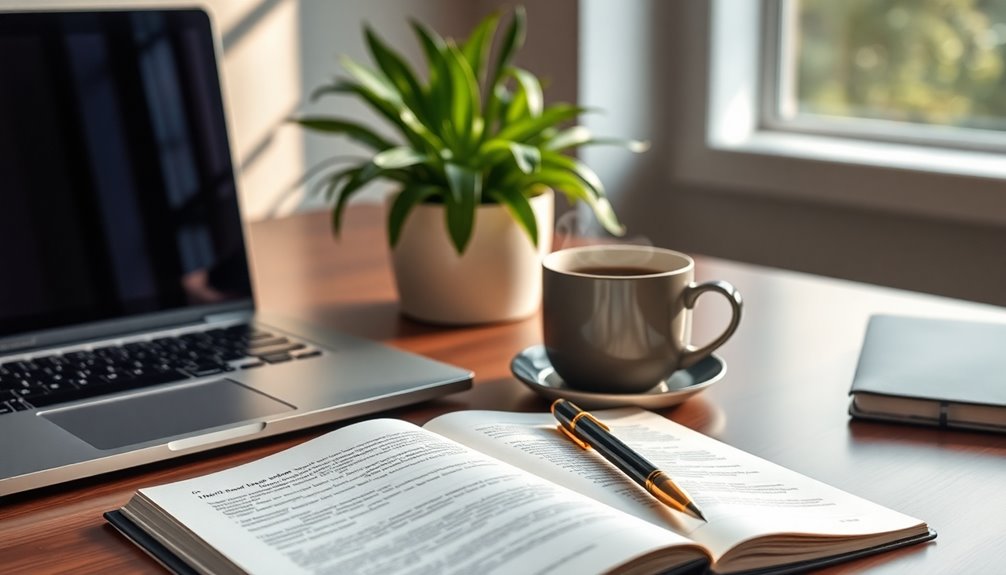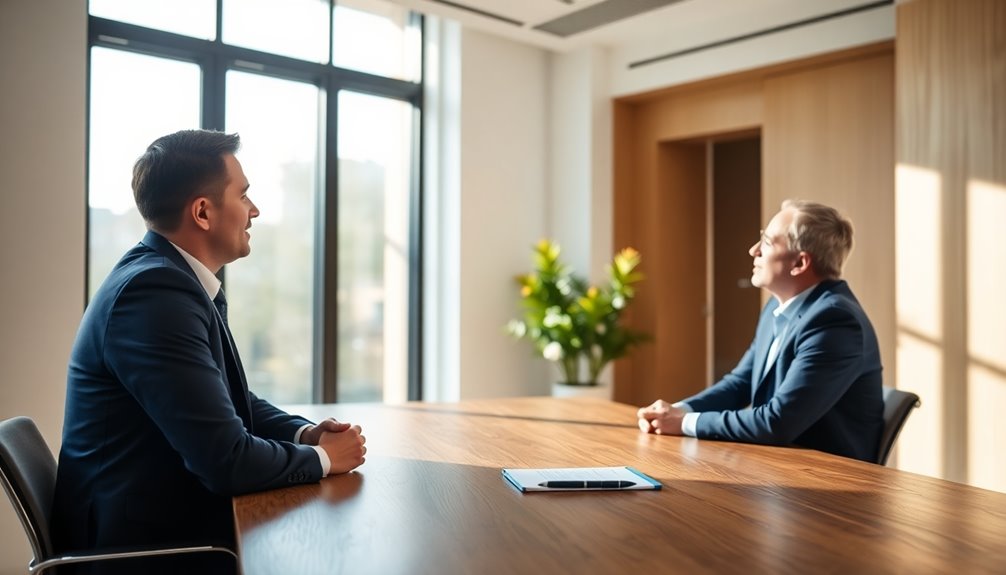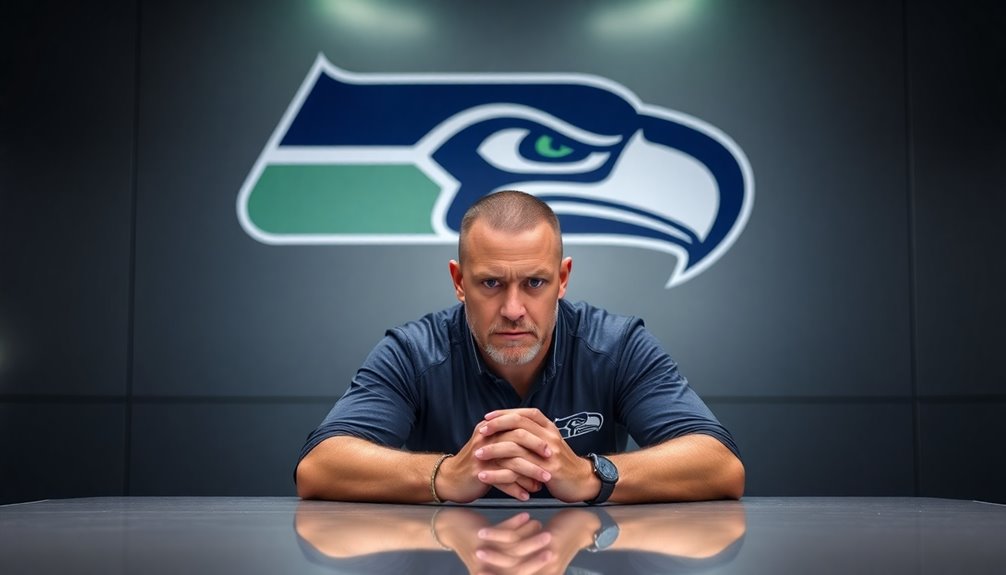To ace your interview, focus on mastering storytelling techniques. You can engage your interviewer by sharing personal experiences using the STAR method, which helps you structure your responses clearly. Make sure to include compelling details that evoke emotions and resonate with your audience. Throughout the conversation, practice active listening to build rapport and demonstrate genuine interest. Remember to maintain eye contact and manage your pace with natural pauses. Nail your narrative, and you'll leave a lasting impression. If you want to uncover more game-changing strategies, keep exploring what else can set you apart in the interview process.
Key Takeaways
- Use the STAR method to structure your responses, ensuring clarity and relevance in your storytelling.
- Engage interviewers by personalizing your questions and referencing shared experiences to build rapport.
- Practice active listening to demonstrate genuine interest and adaptability during the conversation.
- Dress appropriately to create a strong first impression and reflect the company culture.
- Follow up with a personalized message, referencing key discussion points to reinforce your interest.
Importance of Preparation

When preparing for an interview, taking the time to research the company can set you apart from other candidates. You should explore the company's history, recent announcements, and its mission and values. This knowledge helps you tailor your responses and demonstrate your alignment with the organization's goals.
Browse the company's website and social media profiles to grasp the company culture and employee dress code. Understanding company background is essential for relevant discussions during the interview.
Review the job description closely, focusing on the required skills and responsibilities. This allows you to connect your qualifications directly to what the company is looking for. Highlight relevant examples from your experience that showcase how you fit the role.
By anticipating interview questions and practicing your responses, you'll boost your confidence and reduce stress. Understanding your strengths and weaknesses will help you articulate your fit for the position.
Finally, dress appropriately to make a good first impression and avoid any pitfalls, like not knowing key details about the company. By preparing thoroughly, you'll show your genuine interest in the role and leave a lasting positive impression.
Mastering Storytelling Techniques

Storytelling is a powerful tool in interviews that can set you apart from other candidates. When you weave compelling narratives, you engage your interviewers and leave a lasting impression. Compelling stories create memorable interview experiences.
Here are three key techniques to master your storytelling:
- Define the Purpose: Know the message you want to convey. Whether it's to educate or inspire, clarity will guide your story.
- Use a Logical Structure: Organize your story using frameworks like the STAR method (Situation, Task, Action, Result). This guarantees your narrative flows smoothly.
- Incorporate Emotional Context: Connect emotionally by using relatable themes or surprising elements, making your story memorable.
As you prepare, reflect on personal experiences and identify pivotal moments. Start with time and location markers to anchor your audience, and be concise—aim for 1-3 minutes.
Remember to engage the interviewers with eye contact and natural pauses, making your delivery conversational. By crafting a well-structured story that resonates with your audience, you'll not only showcase your qualifications but also your ability to connect on a deeper level.
Building Engagement and Rapport

Building engagement and rapport during an interview is essential for making a positive impression. To achieve this, practice active listening. Show the interviewer you’re not just waiting for your turn to speak; genuinely process their words and respond thoughtfully. Ask questions that reflect your understanding of the company’s needs, positioning yourself as an attentive candidate. Additionally, using positive body language, such as maintaining eye contact and nodding, can also convey your interest and engagement. It’s important to show enthusiasm for the opportunity, as this can leave a lasting impression. In a competitive job market, declining job interviews can be a missed opportunity to showcase your skills and fit for the role. Therefore, taking the time to build rapport and engage in the interview process can significantly improve your chances of securing the position.
Personalizing the conversation helps create a connection. Inquire about the interviewer's experiences, interests, or insights. Remember their name and refer back to details shared during your chat. This shows you value the interaction and are invested in the conversation. Establishing personal connections not only fosters a more relaxed atmosphere but also makes you memorable in the interviewer's mind. Additionally, demonstrating empathy and adaptability can help you navigate the interview effectively.
Lastly, convey genuine interest. Ask insightful questions about the company's goals, culture, and recent achievements. Discuss current events relevant to the industry, illustrating that you've done your homework. This approach not only showcases your enthusiasm but also highlights your long-term commitment to contributing to the company's success.
Ensuring Clarity and Articulation

Creating a strong connection with your interviewer sets the stage for effective communication, but clear and articulate responses are what truly convey your qualifications.
To guarantee your answers resonate, focus on these three strategies:
- Structure Your Responses: Use frameworks like the STAR method to organize your thoughts. Start with the main point, add details, and wrap up by reiterating your answer.
- Manage Your Speech and Pace: Take a brief pause before answering to gather your thoughts. Speak slowly and use pauses to keep your message clear. Eye contact can also help regulate your pace. Effective communication can significantly influence interview outcomes.
- Be Direct and Concise: Lead with a direct answer to the question. Avoid unnecessary details at the outset and keep your sentences short and impactful. If you need clarification on a question, ask, but don't overcomplicate your response.
Strategic Follow-Up Practices

Although interviews can be nerve-wracking, the follow-up is just as essential in making a lasting impression. Start by gathering information during the interview. Ask the hiring manager about the process and timeline to know when and how to follow up. Clarify if this interview is the final step and when you can expect to hear back.
Once the interview wraps up, utilize LinkedIn to deepen your professional connection. Send a connection request to the interviewer with a personalized note about a shared interest or topic you discussed. This helps maintain contact and keeps you top of mind.
When crafting your follow-up message, reference key discussion points and commonalities to make it personal and impactful. Send your message within a day or two after the interview, keeping it concise yet thoughtful. Avoid generic phrases; tailor your message to reflect the specific conversation. Additionally, be sure to clarify the expected follow-up timeframe with the hiring manager to set your expectations appropriately.
Finally, consider asking the interviewer if they'd be open to follow-ups in the coming weeks. Email is usually best for follow-ups, providing a clear record of your communication.
With these strategic practices, you'll position yourself as a candidate who's genuinely engaged and interested.
Frequently Asked Questions
How Should I Dress for a Job Interview?
When dressing for a job interview, you should research the company's dress code and the position's level of formality.
For business formal, opt for a tailored suit in conservative colors. If the environment is business casual, dark jeans with a neat shirt work well.
Always guarantee your clothing fits properly and looks polished.
Remember to keep accessories subtle and maintain good personal hygiene to create a positive impression.
What Should I Bring to the Interview?
When you're preparing for your interview, make sure you bring key documents like several copies of your resume and a list of references.
Pack a portfolio showcasing your work, a notepad for jotting down notes, and a pen or two. Dress professionally and consider bringing business cards if you have them.
Don't forget directions to the venue and any specific documents the employer requested. A folder helps keep everything organized, too!
How Early Should I Arrive for the Interview?
Ever heard the saying, "Better late than never"? Well, that doesn't apply to interviews!
Arriving 15 minutes early shows you're professional and reliable. It gives you time to check in, complete paperwork, and mentally prepare.
Just make sure you don't show up too early; 30 minutes might make the hiring team feel rushed.
For virtual interviews, log in 5 to 10 minutes early to check your tech. It's all about making a great impression!
Can I Follow up After the Interview?
Yes, you can definitely follow up after the interview!
It's best to wait 24-48 hours to give the interviewer some time to reflect. In your follow-up, express gratitude, reiterate your interest in the position, and reference specific points discussed during the interview to show your engagement.
Whether you choose email or a phone call, make it personal and professional. Just remember to respect their time and avoid being too pushy.
What if I Don't Know the Answer to a Question?
What do you do when you're stumped by a question? First, acknowledge your uncertainty honestly; it's okay not to know everything.
Apologize briefly, then ask for clarification or examples to better understand the question.
You can also redirect the conversation to a related area where you feel more confident.
Conclusion
As you step into the interview room, think of yourself as a skilled painter, ready to create a masterpiece. With every story you tell and connection you forge, you're adding vibrant strokes to your canvas. The clarity of your words becomes the frame that holds it all together, while your follow-up acts as the final touch that leaves a lasting impression. Embrace this one unforgettable trick, and let your unique artwork shine through, enthralling your audience.









